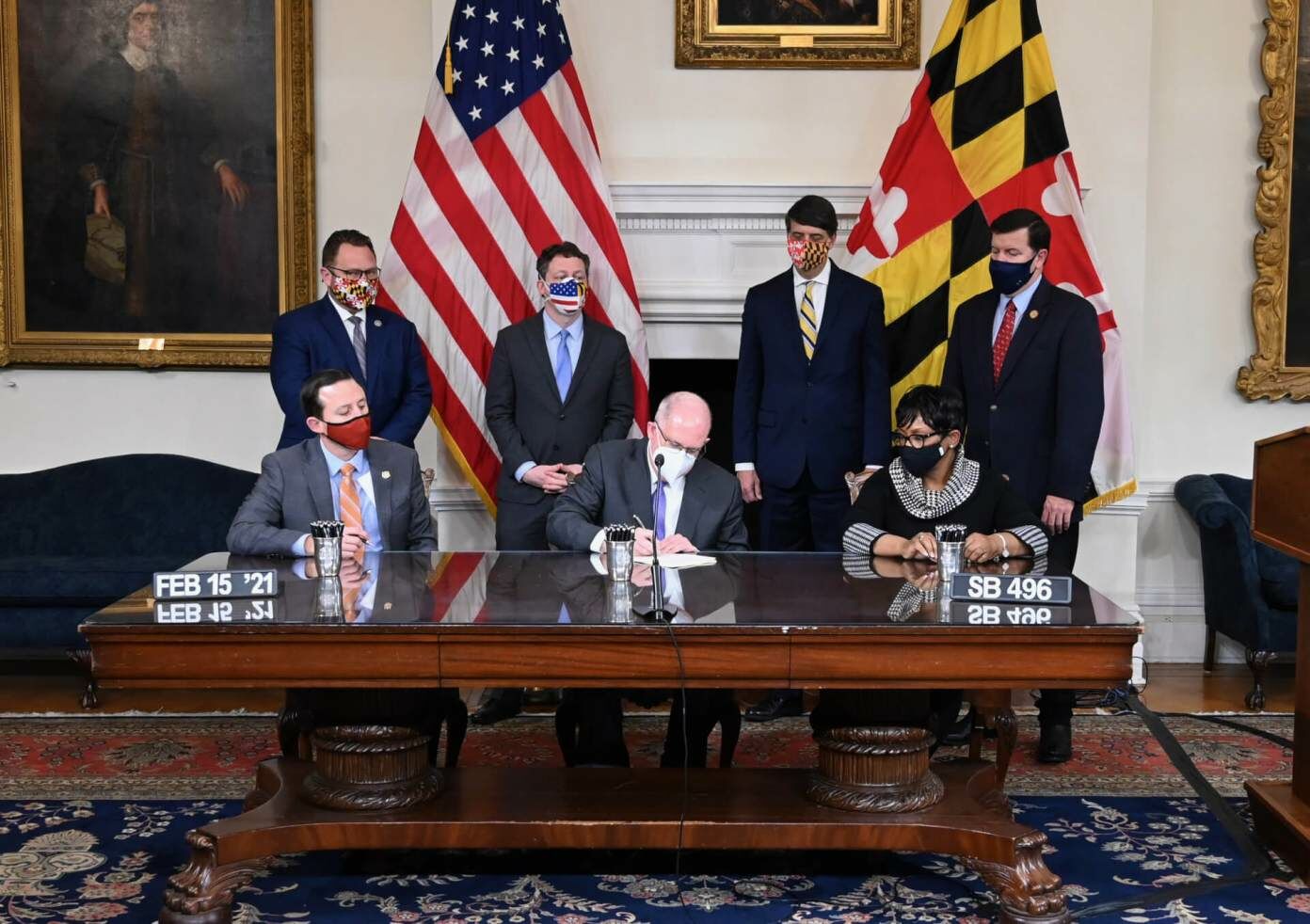This article was republished with permission from WTOP’s news partners at Maryland Matters. Sign up for Maryland Matters’ free email subscription today.

This content was republished with permission from WTOP’s news partners at Maryland Matters. Sign up for Maryland Matters’ free email subscription today.
Gov. Lawrence J. Hogan Jr. (R) signed a heavily amended version of his billion-dollar COVID-19 relief package into law Monday, authorizing thousands of low-income Marylanders to get stimulus checks.
Hogan, along with Senate President Bill Ferguson (D-Baltimore City) and House Speaker Adrienne A. Jones (D-Baltimore County), lauded the speedy and largely bipartisan passage of the RELIEF Act through the legislature before signing the bill into law Monday.
“It’s almost unheard of for any major piece of legislation to pass in such a short period of time, and with such universal bipartisan support,” said Hogan, who repeatedly pressed for quick passage of the legislation.
The relief package was subject to heated debate and several amendments as it made its way through the General Assembly over the past month, with lawmakers characterizing its final form as a “compromise.”
“This bill that got passed is not a Democrat bill,” Jones said. “It’s not a Republican bill. It’s a bill for the people that all of us here represent.”
Under the finalized relief package, low-income taxpayers who filed for the Earned Income Tax Credit (EITC) in 2019 will receive direct stimulus payments of $500 or families and $300 for individuals.
The package also includes the largest single EITC increase in Maryland history, House Majority Leader Eric G. Luedtke (D-Montgomery) said last week. The RELIEF Act will increase the state’s match to the federal EITC for taxpayers with dependents from 28% to 45% for three years. That means a family with two or more kids that earns $25,000 a year will see a yearly credit increase of roughly $1,100, Luedtke said.
Businesses and certain taxpayers will also see substantial tax cuts as a result of the relief effort: The package slashes taxes on unemployment benefits for Marylanders who meet certain income criteria, and also prevents businesses from seeing a drastic increase in unemployment taxes due to COVID-related layoffs.
Businesses will also be able to hold off on paying unemployment taxes until next year, a portion of the bill that Luedtke likened to a yearlong, interest-free loan. Other components of the RELIEF Act include a temporary sales tax break for small businesses, and eliminating taxes on pandemic-related grants and forgiven loans.
The package also includes nearly $300 million in targeted relief funding to help struggling Marylanders, including funding for food banks and utility bill relief.
Comptroller Peter V.R. Franchot (D) plans to hold a press conference Tuesday with other top fiscal officials to lay out how the RELIEF Act will be implemented. According to a release, his office will begin processing some of the bill’s provisions as early as Tuesday.
The House passed the relief effort last week after a last-minute debate over whether to send out stimulus checks to a broader group of taxpayers. Advocates and some Democratic lawmakers worried that, because the EITC requires a Social Security number, thousands of immigrant taxpayers would be left out.
People who file taxes with individual taxpayer identification numbers (ITIN), including undocumented immigrants, won’t receive the RELIEF Act’s stimulus checks. House Democrats made an eleventh-hour effort to add ITIN filers to the bill last week, but that amendment was withdrawn after Republican objections and questions over the amendment’s viability threatened to hold up the fast-tracked bill.
In a Friday press release, leaders of the Maryland Legislative Latino Caucus said Attorney General Brian E. Frosh (D) warned lawmakers that the original proposal to include ITIN filers in the RELIEF Act “would not be viable.”
Instead, Jones and Ferguson have promised to quickly pass legislation that would extend EITC benefits to ITIN filers for the 2020, 2021 and 2022 tax years, Ferguson said at a media briefing last Friday. More than 86,000 ITIN filers paid more than $100 million in state and local taxes last year, according to Franchot, and many of those taxpayers would meet the EITC income criteria.
“No Marylander deserves to wonder where their next meal will come from, how to buy their child’s diapers, or how to pay for life saving medicine – especially when they go to work every single day,” a Friday statement from Jones and Ferguson reads.
ITIN filers represent a broad group of taxpayers, including undocumented immigrants and “some people who are lawfully present in the U.S., such as certain survivors of domestic violence, Cuban and Haitian entrants, student visa–holders, and certain spouses and children of individuals with employment visas,” according to the National Immigration Law Center.
Those taxpayers have been excluded from various federal relief efforts this year, advocates say, since many of those programs require a Social Security number.
Franchot was among the critics of the final RELIEF Act. In a statement after the House passed the relief package last week, Franchot said the effort “falls considerably short,” but was improved by legislative amendments.
He added that he plans to work with legislators to “provide EITC benefits to all eligible Marylanders ― regardless of whether they file their taxes with a Social Security Number or an ITIN ― as soon as possible.”
- Sign up for WTOP alerts
- Latest coronavirus test results in DC, Maryland and Virginia
- Coronavirus vaccine FAQ: What you need to know
- Latest vaccination numbers in DC, Maryland and Virginia
- Md. COVID-19 vaccine update: How many doses is your county getting?
- You’re on the list: Va. statewide COVID-19 preregistration site aims to calm fears
Looking for more information? D.C., Maryland and Virginia are each releasing more data every day. Visit their official sites here: Virginia | Maryland | D.C.







